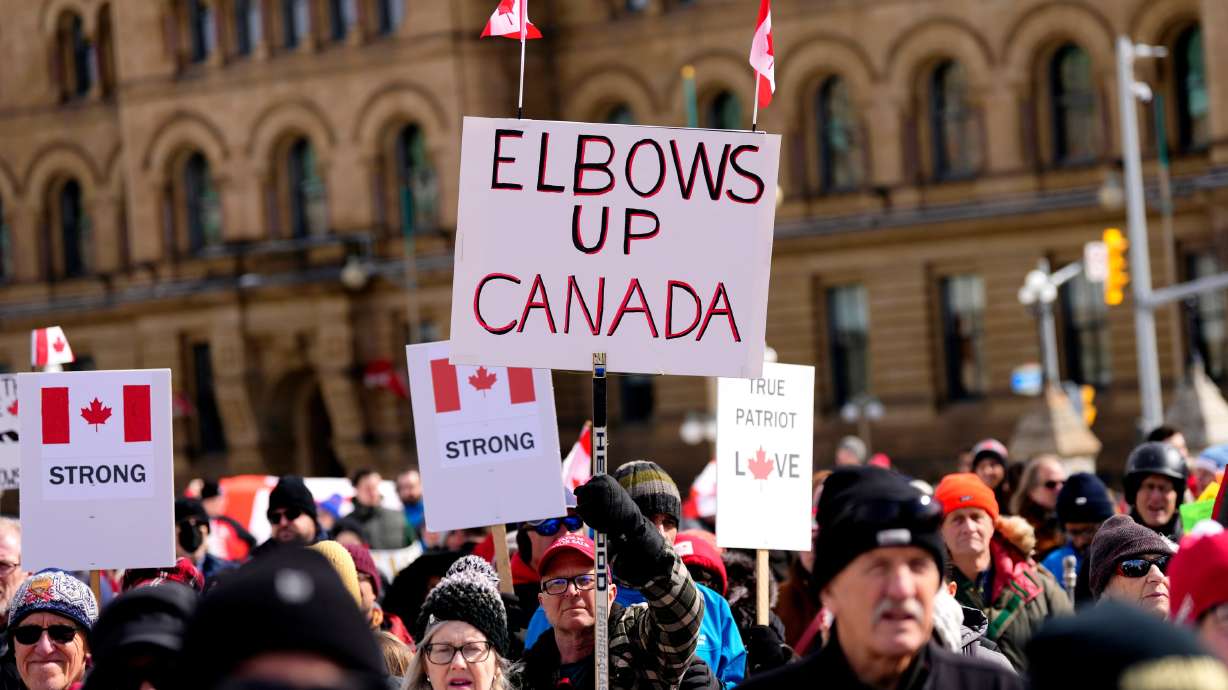Estimated read time: 5-6 minutes
- President Donald Trump's foreign policy may impact Canada's election, affecting Conservative lead over Liberals.
- Canadian voters shifted focus to international issues, boosting Liberal leader Mark Carney.
- Quebec's support for Liberals grows, with increased Canadian pride amid Trump's U.S. annexation comments.
SALT LAKE CITY — President Donald Trump's foreign policy hasn't just overturned global markets; it may have cost the Canadian Conservatives the parliamentary election on Monday.
In January, Canada's Conservative Party led the Liberals by more than25 percentage points in the federal race, with former Prime Minister Justin Trudeau receiving record-low approval ratings, and his opponent, Pierre Poilievre, projected to secure a historic majority.
"It looked like, to all intents and purposes, a slam dunk for the Conservatives," said Fen Hampson, a professor of international affairs at Carleton University in Ontario. "Many pundits were predicting the demise of the Liberal Party."
Then Trump took office and immediately targeted Canada with his first round of new tariffs and doubled down on suggestions that the United States should annex its northern neighbor.
"The only thing that makes sense is for Canada to become our cherished Fifty First State," Trump said in a post on March 11. "This would make all Tariffs, and everything else, totally disappear."
In a rapid reversal, the Conservatives' lead evaporated as a greater number of voters shifted their priorities from domestic to international concerns.
What happened to Canadian Conservatives?
For the previous year, Poilievre had focused his message on labeling Trudeau as the source of Canada's ballooning debt, burgeoning inflation and burdensome carbon tax, according to Charles Bernard, the lead policy adviser for Impact Public Affairs, one of Canada's top political consulting firms.
And it worked.
"The Conservative Party ideas were resonating," Bernard said. "Especially with the youth in Canada, on housing and cost of living and less government intervention."
But by the time Trudeau officially resigned in March, the unpopularity of his Liberal Party had become overshadowed by outrage toward the policies coming out of Washington, D.C., Bernard said.
Now, the Liberal Party, under the leadership of political newcomer Mark Carney, holds a slight lead in most polls, with a majority of those who switched their support to the liberals citing Trump's actions and Carney's leadership as their top reasons for making the swap.
For a third of Canadians, addressing Trump's policies is the No. 1 or No. 2 most important factor in determining how they plan to vote in the April 28 elections, pollsshow.
And for many, this shift in top issues has pushed them to support Carney despite his former position as an economic adviser to Trudeau.
"Canadians really began to be quite concerned that Trump's ambitions weren't just tariffs but to take over Canada," Hampson said. "What I would call 'bread and butter issues' were essentially relegated to the back burner, and the front burner was 'Who's best positioned to save Canada?'"
In an interview with the Deseret News, Jason Ogg, a Montreal resident who is originally from Manitoba, said that his compatriots did not interpret Trump's 51st state comments as a joke.
"No, not at all," Ogg said.
Who is the Canadian prime minister?
As acting prime minister, Carney has emphasized his resume: appointed governor of the Bank of Canada in 2008 to manage the global financial crisis, recruited as the first non-British citizen to run the Bank of England during Brexit and called to serve as the United Nations envoy on climate action and finance.
Carney, who has never faced voters for elected office before, has come up short in comparison to Poilievre in terms of charisma and public debate, Bernard said. But that appears to be a secondary concern compared to his background in international economic relations.

Prominent Canadian conservatives, including Jordan Peterson, have criticized Carney for his technocratic approach and his priority of creating global initiatives to counter climate change.
Poilievre has tried to characterize Carney as the continuation of a failed status quo, emphasizing his own brand as a change-maker even as he has attempted to distance himself from Trump and his populist style.
Meanwhile, Trump has signaled he is not worried about the result of the Canadian election or his influence on it. In March, he said on Fox News that he thought it would be "easier" to negotiate with Carney in office than Poilievre.
Has Trump united Canadians?
Ultimately, the outcome of the election won't come down to Trump, though; it will come down to Quebec, according to Hampson.
Support for the separatist French Canadian party, Bloc Québécois, and the progressive New Democratic Party, have both "collapsed" in Quebec, Hampson said.
Despite their history of trying to seek independence, Quebec voters — many of whom speak French as a first language — appear poised to support the Liberal nominee because "Quebecers realize that they're better off in Canada than they would be as an island in the United States," Hampson said.
A recent poll found that since December the share of Quebec voters who say they are proud to be Canadian has increased 13 percentage points from 45% to 58%.
Earlier this month, Montreal native Yanick Blouin told the Deseret News at a hockey game between the Montreal Canadiens and the Detroit Red Wings that he had never seen so much patriotism among fellow Canadians.
"I feel stronger as a Canadian," Blouin said. "The French wanted to separate from the rest of Canada for a long time, and now we see a strong union is growing in Canada, which is good for us."









